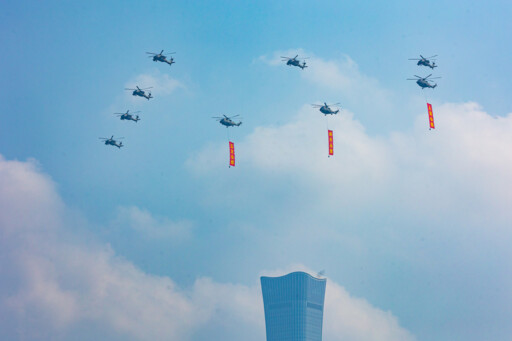


V-Day parade shows China’s commitment to global peace

Helicopters carrying banners that read “Justice Prevails,” “Peace Prevails,” and “The People Prevail” fly over Beijing during the military parade on Sept. 3. Photo: IC PHOTO
On Sept. 3, a grand gathering commemorating the 80th anniversary of the victory of the Chinese People’s War of Resistance Against Japanese Aggression and the World Anti-Fascist War was held at Tian’anmen Square, Beijing. A magnificent military parade marked this historic occasion, joining people around the globe in envisioning a brighter future.
In interviews with CSST, international scholars widely agreed that, at a time when the law of the jungle is reasserting itself and the flames of conflict frequently erupt, China has demonstrated its resolve to firmly uphold the outcomes of WWII victory, promote global peace, and defend international fairness and justice.
China as main anti-fascist front
Discussing the commemorative event, Stephan Ossenkopp, a research fellow at the Schiller Institute in Germany, said he was particularly impressed by the impeccable bearing of the troops, their confident strides, and their high morale as he watched the entire ceremony.
“This is a solemn moment, a spectacular moment. The commemorative activities are splendid. Many details are elaborately designed and soul-stirring. 80,000 doves spread their wings and flew high, and 80,000 balloons rose into the air. It signals special symbolic meanings,” Ossenkopp stated, adding that the event radiated a message of unity and responsibility for a safe and prosperous future for humanity, while underscoring China’s determination to build a world-class military capable of defending its national interests and contributing to international security.
The commemoration in Beijing holds global significance because it helps audiences around the world recognize China as a critical ally in defeating Japanese aggression during WWII, Alexis Dudden, a professor from the History Department at the University of Connecticut in the United States, told CSST.
Kimie Hara, a professor of East Asian studies at the University of Waterloo in Canada, observed that the parade both commemorates the fallen and reminds society of the immense human cost of war, while also highlighting China’s place in the broader global history of WWII and situating it within a shared international narrative.
Firm commitment to peace
The Chinese nation has consistently upheld the value of peace. The peace it enjoys today was hard-won, making it all the more imperative to cherish and defend it. Ossenkopp elaborated that the military parade reflects the Chinese people’s aspiration for peace, noting that the government remains committed to peaceful coexistence with all neighboring countries and the entire global community.
A notable highlight of the event was the inclusion of a peacekeeping contingent. Since joining UN peacekeeping missions, China has dispatched more peacekeeping troops than any other permanent members of the UN Security Council.
“Over the past 35 years since it began participating in UN peacekeeping operations, China has always supported multilateralism, seeking to engage with the international community on equal footing. Its significant contributions to UN peacekeeping operations and adherence to drawing wisdom and strength from history underscore China’s role as a key force for peace,” remarked Luis Antonio Paulino, Brazilian director of the Confucius Institute at Sao Paulo State University in Brazil.
Hara stressed that China’s participation in UN peacekeeping operations and the promotion of international initiatives reflect the expansion of its global responsibilities in parallel with its economic rise. Concepts such as the “community with a shared future for humanity” and the “Global Security Initiative,” “Global Development Initiative,” “Global Civilization Initiative,” and the newly proposed “Global Governance Initiative,” all emphasize cooperation over confrontation.
China’s role and responsibilities in supporting international stability have become increasingly significant and widely expected, Hara asserted.
Significance of honoring history
Hara added that preserving the memory of China’s war of resistance against Japanese aggression has helped foster unity and a sense of collective purpose. Remembering past hardships provides the spiritual foundation for present progress, demonstrating that modernization is not only about material advancement but also deeply connected to values and identity.
“Anyone that forgets the past is condemned to repeat the same mistakes in the future,” Paulino affirmed. Stressing the particular importance of the 80th anniversary of WWII victory for both China and the world, he noted that China is now the most important international force capable of preventing a new tragedy.
“Were it not for China I think that the world would be in a much worse situation. China is now the main fortress against fascism in the world,” Paulino said. “The world could see a nation that loves peace, that doesn’t forget the lessons of the past and it is prepared to avoid the turn back of the world to a past that claimed so many lives to be defeated.”
Dudden echoed that it is more important than ever for leaders to understand their nations’ pasts as lived history. “It is important for all nations to realize that learning about violence in our shared past is not a call to future arms. Instead, it is a reason to look squarely at issues such as economic inequality and climate insecurity as issues that must be collectively addressed. The only thing to learn from the past is how to make better choices in the present and with an eye to the future.”
Editor:Yu Hui
Copyright©2023 CSSN All Rights Reserved